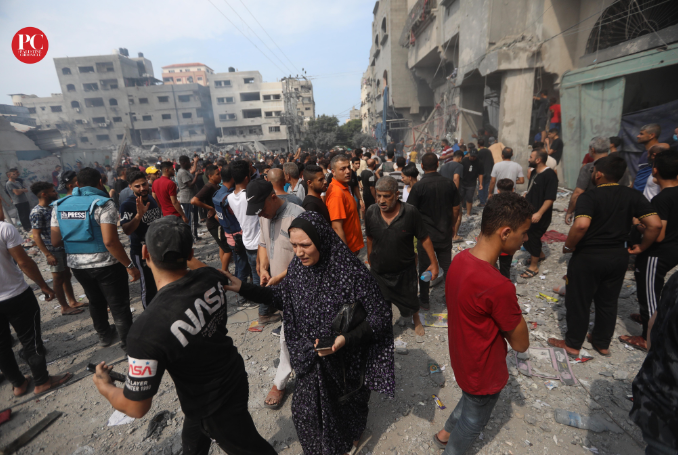One Year On – Five Things the War on Gaza Taught Us about the Palestinian Struggle

Israel continues to carry out massacres against Palestinian civilians in Gaza.(Photo: Mahmoud Ajjour, Palestine Chronicle)
By Ramzy Baroud
The last year of a relentless Israeli war on Gaza, and bloody raids and violence in the West Bank have been largely viewed in terms of their horrific humanitarian outcomes: the unequaled killing of tens of thousands, the obliteration of Gaza and the destruction in the West Bank.
While humanitarian urgency must indeed be a priority, other factors are also deserving of consideration, especially as we mark the one-year anniversary of the ongoing war.
Even though the mass killing is yet to end, there are several conclusions that can already be drawn about the long-term consequences of the war.
One, Palestinians, despite the military occupation, the siege and the numerous failures of their leadership, remain political actors, with powerful agency.
This agency does not stem from any superficial achievements of their autocratic leadership or the still symbolic recognition of the state of Palestine, but the collective resilience and power of ordinary Palestinians in Gaza and throughout Occupied Palestine.
The war in Gaza would have looked different if Palestinian society broke down in the face of the war machine, fragmented into fighting factions or grew desperate in the face of impossible pressures – war, unprecedented destruction, acute famine, etc.
This fact alone reassures us that the Palestinian people’s destiny will not be that of erasure or even marginalization, but of continuity and even future prosperity.
Two, that Arab societies, however consumed with their own struggles, social and political challenges, remain united in perceiving the Palestinian cause as a top Arab priority. This has allowed many Arab governments to reiterate their position regarding the centrality of the Palestinian cause.
Though current circumstances may, for now, prevent some Arab societies from being direct participants in turning their devotion to Palestine into tangible and practical support, the future shall prove that the renewed centrality of Palestine in Arab political and popular discourses will have its own weight and value.
The same logic applies to the Muslim Ummah, which has never been so united around a cause in decades as it is now united around Palestine. This can be felt in all Muslim countries, and among Muslim communities around the world, especially in the West.
The future shall reveal more regarding the meaning of the return of Palestine to the embrace of Arabs and Muslims. However, one can already conclude that the resilience of the Palestinian people has, once more, refocused the attention on Palestine as the leading cause of all Arabs and Muslims.
Three, though international law remains as ineffective as ever, the bloody war in Palestine is creating rifts between the Global South and the Global North. The latter, with a few exceptions, remains adamant in repeating old mantras about Israel’s ‘right to defend itself’, while disregarding all Palestinian rights.
However, many countries in Africa, the Middle East, South America and elsewhere are becoming louder and bolder in their demands for justice for Palestinians, and for the equal application of international law.
The Global South’s political revolt has already resulted in slow, but serious actions taken by the International Court of Justice, the International Criminal Court and, as of late, the United Nations General Assembly as well.
The UNGA passed a resolution on September 17 that assigned an actual deadline for when the Israeli occupation of Palestine must end. Resolution A/ES-10/L.31/Rev.1, and its “no later than 12 months” deadline essentially declared null and void all actions that Israel has illegally carried out in the Occupied Territories, including all settlements, annexation of Palestinian land and all the rest.
Four, a whole generation of people around the world has been affected by the horror show in Gaza. The gory images, the desperate pleas of children who lost their parents, the unbelievable destruction and the failure of the international system to stop any of this, will be etched in the collective memory of the world for many years to come.
This means that the boundaries of global solidarity with Palestine will finally break the confines of the Middle East into new and growing geographic and cultural spaces, and that, at least in the West, Palestine will no longer remain a political discussion or an academic subject.
The new global consciousness that has developed around the Palestinian struggle may have already achieved the required critical mass which will, with time, result in the much-coveted paradigm shift: justice for the Palestinian people.
And last, one year of war has taught us that, while superior firepower may determine political outcomes in the short run, no amount of weapons can possibly break the will of a nation that has vowed to restore its dignity and win its freedom, no matter the cost.
– Dr. Ramzy Baroud is a journalist, author and the Editor of The Palestine Chronicle. He is the author of six books. His latest book, co-edited with Ilan Pappé, is ‘Our Vision for Liberation: Engaged Palestinian Leaders and Intellectuals Speak Out’. His other books include ‘My Father was a Freedom Fighter’ and ‘The Last Earth’. Baroud is a Non-resident Senior Research Fellow at the Center for Islam and Global Affairs (CIGA). His website is www.ramzybaroud.net










































0 Comments